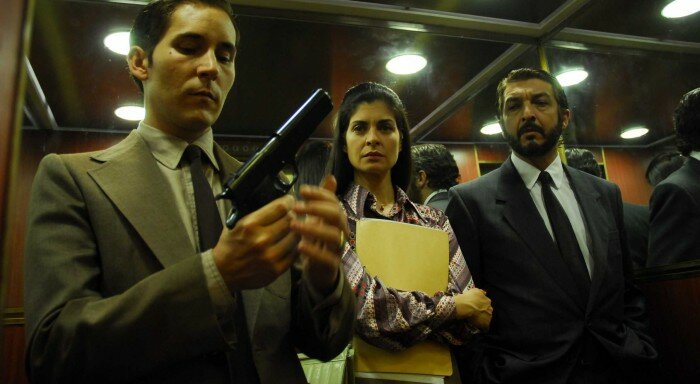Crime-drama movies never really have much trouble satisfying my need for a good, solid story – and I’m not the only one. With the genre’s prevalence in film and television, it’s clear that a simple criminal investigation can go a long way with audiences. Argentinean film, The Secret in Their Eyes is the latest offering of its type, not only meeting my general expectations but surpassing them, with a simple, yet unpredictable plotline that has you guessing until the very end.
That last sentence might seem a little cliché, but with this film it is absolutely true. I found myself questioning many moments throughout, trying to gauge wether the filmmaker’s technique was deliberately or mistakenly leading my suspicions. This is the primary reason the picture is so enjoyable, so I will attempt to give a spoiler-free synopsis for fear of ruining the build-up to its stellar ending.
As a former investigator for the courts in Argentina, Benjamin Esposito (Ricardo Darin) was no stranger to a crime scene. Despite this, one particularly heinous crime and the events surrounding it have stayed with him over the years. After seeing the devastation left by the brutal rape and murder of a young woman and its curse upon her partner Ricardo Morales (Pablo Rago), Benjamin resolves to find the killer at all costs. With the burden of a drunken co-worker and romantic tensions with Irene (Soledad Villamil), a new colleague, Benjamin experiences more than he bargained for in handling the case. Several years later, the events have lingered in his mind so much that he decides to put his memories to paper in the form of a book. Enlisting the advice of Irene, now a court Judge, Benjamin soon discovers the past is catching up with him.
Sufficiently disturbing, while not at all feeling like a gratuitous attempt at shock-value, The Secret in Their Eyes attempts to tell a story about time, as well as an atrocity. Time acts as a strong theme in the film, with its effects on the characters and their philosophy becoming evident as a result of the crime. Living through the past, or the present becomes a major conflict and the movie successfully reminds the audience of this rather strong theme without being overly pretentious or preachy.
The film also plays around with the past and present well. Little details are etched into the scenes, seamlessly connecting the two realms. An example of this is the use of an old typewriter that fails to print the letter “A”, which first appears in the present, but is later referenced several times in the past. The effects of time are also not lost on the characters, both physically and mentally. Thankfully, the same actors are used to portray the characters in both eras by using subtle makeup to show the passage of time. The mental effects of time are also portrayed well by Villamil and Darin, with their character’s composure and confidence changing believably between the two eras. This attention to detail really helps to gel this rather epic story together.
All technical aspects of the film deliver an atmosphere that sufficiently compliments the story. Some of Benjamin’s memories are presented with a hint of melodrama, including the use of stylized open shutter photography, special effects and rather emotive music. But this sort of drama is momentary and relative to the story, as we soon discover memories can be romanticised – as in real life. As for the rest of the film, the photography is unintrusive and large in scope without becoming alienating. Beautiful static wide shots of the countryside or the judicial halls add atmosphere to the film, while more intimate scenes make use of superb lighting. As the film progresses, the passage of time seems to be represented in a more bleak and colourless world, with the palette being reduced near the end of the film. Overall, there are no major flaws with the technical presentation, which serves only to add to the story.
This picture feels like it has the tension of Zodiac, but the great ending of Se7en. Because its subtlety and realism fits snugly between these two films, it’s neither too realistic nor too showy. It does everything it needs to deliver something special, without belonging to David Fincher. In fact, director Juan Jose Campanella would do wisely to keep an eye on Fincher, just in case someone has the “bright” idea to fund an American remake. I jest, of course, but if you are a fan of those films, The Secret in Their Eyes should be the next on your list to see. And if you haven’t seen those films, The Secret in Their Eyes should be the next on your list to see.
Verdict:
A brilliantly crafted, well presented crime drama, The Secret in Their Eyes is a movie you have to see for a myriad of reasons, not the least of which its stunning plot.



![2010_secret_in_their_eyes_004[1] 2010 secret in their eyes 0041 e1275100333612 700x275 The Secret in Their Eyes (Review)](/wp-content/uploads/2010_secret_in_their_eyes_0041-e1275100333612-700x275.jpg)




![The Girl with the Dragon Tattoo [2011] (Review) The Girl with the Dragon Tattoo [2011] (Review)](/wp-content/uploads/girl-with-dragon-tattoo-2011-poster11-e1326691158273-150x150.jpg) The Girl with the Dragon Tattoo [2011] (Review)
The Girl with the Dragon Tattoo [2011] (Review)








